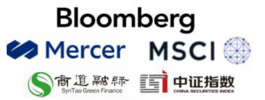In order to implement its Responsible Investment Policy, China Universal has
adopted the following approaches
to responsible investment, and applied them to listed equity, fixed income and fund of fund
investments:
- ESG Integration
- Stewardship
- Thematic Investing
- Screening Method
The ESG integration method systematically incorporates ESG factors into
investment analysis and
decision-making. China Universal has formulated the evaluation criteria of responsible
investment
for different asset classes, and established a unified evaluation framework to ensure the
consistency of ESG integration across different teams and industries.

We have developed a proprietary quantitative and qualitative evalua-tion system, CUAM ESG
Rating system, which
is fully embedded in the investment research and decision-making process.
Stewardship aims to bring practical effect to the sustainable
development of the region and market,
which specifically includes two parts: Voting and Engagement in the work.

- Priority of client's interests
- Professional independent judgment
- Not seeking control
- Handling conflicts of interest correctly

- 100% of the companies in portfolio
- On a consistent basis
- Teleconference and onsite visit
- Management conversation
- ESG promotion
The thematic investing method is to invest in companies offering
solutions to sustainable development
issues. These investment provide positive contribution according to United Nations'
Sustainable
Development Goals and will also let us achieve considerable returns within our risk
tolerance.
At present, China Universal has developed several ESG funds. The active funds
include:
China Universal ESG Sustainable Growth Fund
China Universal Carbon Neutralization Fund
China Universal Low Carbon Investment Fund
The passive products include:
China Universal CSI New Energy Vehicles Industry Index (LOF)
China Universal CSI New Energy Vehicle Industry ETF
China Universal CSI Photovoltaic Industry ETF
China Universal CSI Battery Thematic ETF Initiating Feeder
Fund
China Universal CSI Photovoltaic Industry Index Enhanced Fund
China Universal CSI Battery Thematic ETF
China Universal CSI SEEE CARBON NEUTRAL ETF Initiating Feeder
Fund
More>>
The screening method uses a systematic approach to exclude companies
that have material and long-term
negative impacts on the environment or society, to minimize the investment risk and manage
the reputation risk of China Universal and its stakeholders.
If evidence shows that a portfolio company has violated international standards or
conventions,
China Universal will:
first engage and vote through the stewardship method, and then consider whether it needs
to be excluded based on its willingness to improve.
ESG Integration
The ESG integration method systematically incorporates ESG factors into
investment analysis and
decision-making. China Universal has formulated the evaluation criteria of responsible
investment
for different asset classes, and established a unified evaluation framework to ensure the
consistency of ESG integration across different teams and industries.

We have developed a proprietary quantitative and qualitative evalua-tion system, CUAM ESG
Rating system, which
is fully embedded in the investment research and decision-making process.
Stewardship
Stewardship aims to bring practical effect to the sustainable
development of the region and market,
which specifically includes two parts: Voting and Engagement in the work.

- Priority of client's interests
- Professional independent judgment
- Not seeking control
- Handling conflicts of interest correctly

- 100% of the companies in portfolio
- On a consistent basis
- Teleconference and onsite visit
- Management conversation
- ESG promotion
Thematic Investing
The thematic investing method is to invest in companies offering
solutions to sustainable development
issues. These investment provide positive contribution according to United Nations'
Sustainable
Development Goals and will also let us achieve considerable returns within our risk
tolerance.
At present, China Universal has developed several ESG funds. The active funds
include:
China Universal ESG Sustainable Growth Fund
China Universal Carbon Neutralization Fund
China Universal Low Carbon Investment Fund
The passive products include:
China Universal CSI New Energy Vehicles Industry Index (LOF)
China Universal CSI New Energy Vehicle Industry ETF
China Universal CSI Photovoltaic Industry ETF
China Universal CSI Battery Thematic ETF Initiating Feeder
Fund
China Universal CSI Photovoltaic Industry Index Enhanced Fund
China Universal CSI Battery Thematic ETF
China Universal CSI SEEE CARBON NEUTRAL ETF Initiating Feeder
Fund
More>>
Screening Method
The screening method uses a systematic approach to exclude companies
that have material and long-term
negative impacts on the environment or society, to minimize the investment risk and manage
the reputation risk of China Universal and its stakeholders.
If evidence shows that a portfolio company has violated international standards or
conventions,
China Universal will:
first engage and vote through the stewardship method, and then consider whether it needs
to be excluded based on its willingness to improve.







